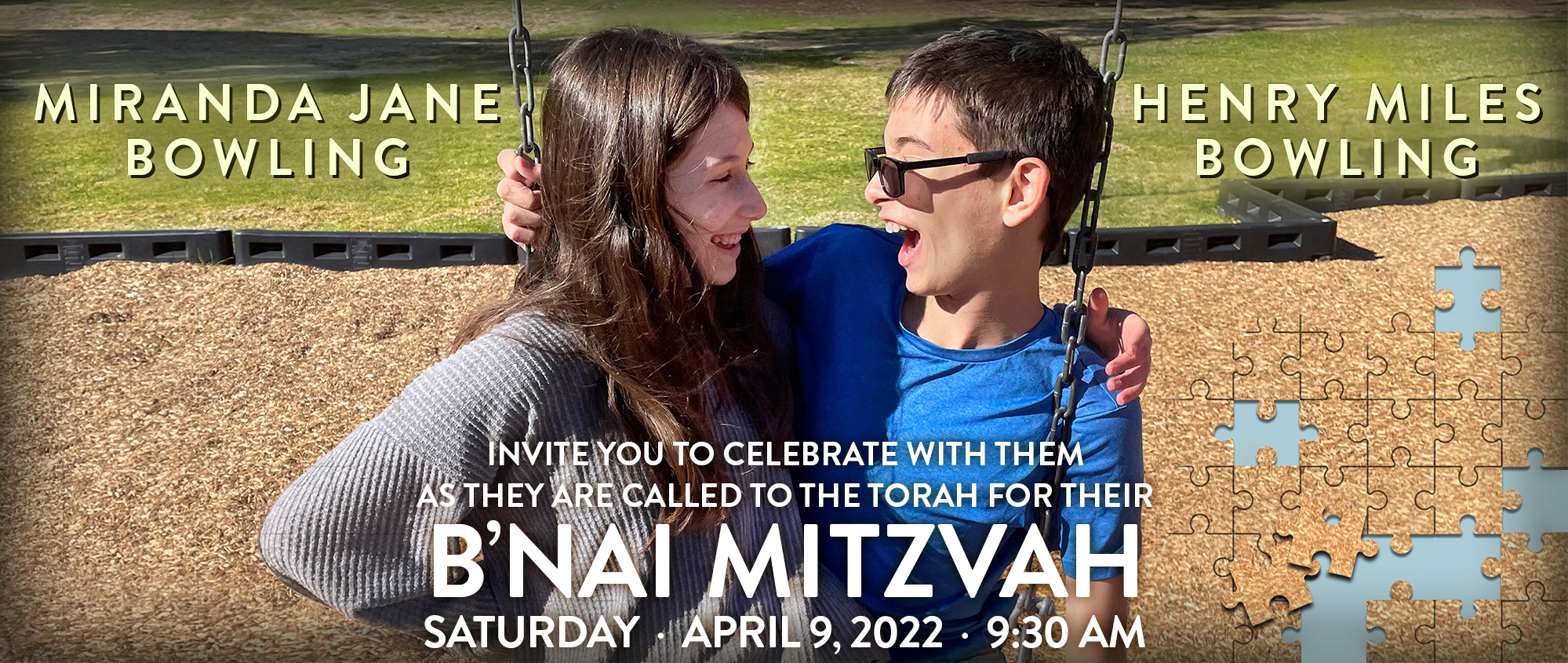WHAT IS A BAR/BAT MITZVAH?
BAT, BAR, B’NAI… WHAT DOES ALL THAT MEAN?
IMPORTANT PROTOCOL
Absolutely no photography is allowed in the sanctuary or on temple grounds during the entirety of Shabbat (Friday sundown to Sat sundown). Please refrain from gum-chewing, and remember to silence your devices, as cell phone usage (as well as any other electronics) is prohibited. Applauding is generally not acceptable in the sanctuary. Instead we use the saying, yasher ko-ach, which means “may you be strengthened,” and is appropriate to say any time a person does a deed that benefits others in a holy way.
WHAT DO I WEAR?
WHAT IS THE DIFFERENCE BETWEEN THE TWO SERVICES?
Friday night celebrates the beginning of Shabbat — a welcoming of the Sabbath. Our Friday night services begin at 7pm and last about an hour to an hour and a half.
The Saturday morning service is the Big Day… the Main Event… the Room Where It Happens!
1) Birchot HaShachar (Blessings of the Dawn) & P’sukei D’Zimra (Verses of Song) make up our preliminary/introductory service meant to prepare us for prayer. This service will be led by Cantor Ray Cohen and is approximately 10-15 minutes long.
2) Shacharit is the morning service that starts with the call to worship (Bar’chu) and is the beginning of the communal prayer. This service will be led by Miranda’s and Henry’s older brother, Ethan, and is approximately 25-30 minutes long.
3) The Torah service is where the B’nai Mitzvah action starts happening!
Henry and Miranda will come to the bima (the raised area in front of the congregation) to receive their tallitot (the plural of tallit, the prayer shawl), presented to them by Abi and Jack, and the Torah will be removed from the Ark for the Passing of the Torah, a very meaningful act that symbolizes the transmission of Jewish values from one generation to the next. We will sing L’dor Vador (from generation to generation) as the Torah is passed from Abi’s Uncle Doug, to Abi, to Ethan, and then to Miranda and Henry.
As an honor, family and friends will be called to the Torah for an Aliyah (recitation of the blessing before and after each Torah reading) and to chant from the Torah for that week’s parsha (a Torah portion read on a specific week). We are very excited that all of the Torah readers at this service are kids, ranging from ages 13-17 (including Ethan)! Miranda will be called to the Torah –for the first time– to recite the blessings and chant the seventh Torah reading, and then Henry will be called to the Torah –for the first time– to recite the blessings and chant the Maftir (the concluding section of the parsha), which concludes the weekly Torah reading.
The Torah will be lifted and dressed and placed to the side, and the kids will give a speech about their journey to this big day, along with their D’var Torah (discussion of the parsha, in English). Then they’ll dive into the Haftarah, which is usually a concluding reading from the book of the Prophets selected by the rabbis of old to complement or develop a subject or theme found in the Torah portion, but in this case is connected to the upcoming holiday of Pesach (Passover). Next up? They’ll likely be pelted with candy (for sake of everyone’s sanity, candy will be handed out to only a few in the first couple of rows). Come to the service or watch the live stream to find out why.
Speeches come next (Director of the Preschool, representative of the Temple Board, representative of the Youth Group, parent speech), and then the Rabbi and Cantor will give a special blessing to Miranda and Henry. After some special English readings, Cantor Ray will lead a call-and-response prayer in Hebrew (the Ashrei) before Henry and Miranda lead the concluding prayers of the Torah service as the Torah is placed back into the Ark.
All in, this Torah service, mostly led by Miranda and Henry, will likely last approximately an hour and a half.
4) Last up is the Musaf service, the additional/supplementary service. This service will be led by Miranda and Henry, with Miranda singing a beautiful version of L’dor Vador (accompanied by Uncle Doug), and includes a special song sung by Doug and Kyle Cotler. This service will last approximately 30-35 minutes long.
WHAT IS A TRADITIONAL GIFT?
We have been asked this question numerous times so we thought it best to cover the answer here. Please know that gifts are not required nor expected. Should you wish to give the kids something, monetary gifts are the most traditional, usually given in multiples of $18 ($18, $36, $54, $72, etc.). Why 18? Chai, the Hebrew word for “life,” has a value of 18. Honestly, our biggest gift will be the opportunity to share this big day with family and friends!

